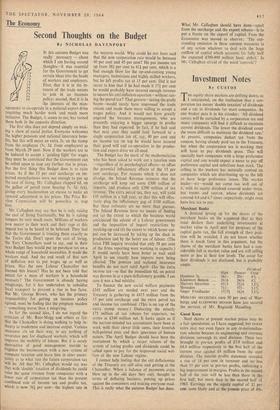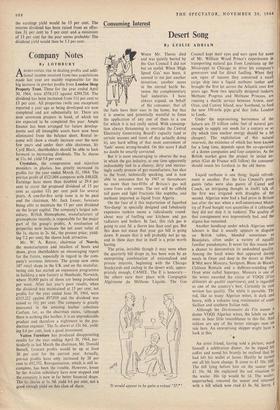Investment Notes
By CUSTOS THE equity share markets are drifting down, as I anticipated, on the realisation that a cor- poration tax means 'double taxation' of dividends and a cut in dividends for most companies. As one broker puts it in his circular: 'All dividend covers will be curtailed by a corporation tax and many companies will find it difficult to maintain current dividends. The lower the dividend cover the more diflicult to maintain the dividend rate.' At present, companies deduct tax from the coupon, having already paid tax to the Treasury, but when the corporation tax is working they will have to pay dividends gross. This will specially hurt companies with a large preference capital and one would expect a move to pay off preference capital and substitute loan stock. The selling in the markets has naturally centred on companies which are distributing up to the hilt or have large preference issues. The market leader—la—would not come too well out of it, with its equity dividend covered under twice, but THORN and JAGUAR, whose dividends are covered 4.4 and 6.7 times respectively, might even have less tax to pay.
Merchant Banks
A demand sprang up for the shares of the merchant banks on the argument that as they must declare their underlying investments at market value in April next for purposes of the capital gains tax, the full strength of their posi- tion will be revealed. I do not know whether there is much force in this argument, but the shares of the merchant banks have had a con- siderable fall in market value and are still selling more or less at their low levels. The cover for their dividends is not disclosed, but is probably ample.
High Dividend Present Yield llambros 5s. 36/- 29/-
4% .:
Klemwort Benson 28/6 24/6 4% Mercury Securities 63/3 53/6 3.2% Shroeders 71/- 57/- 3.1% Singer Friedlander 17/74 16/6 3.3%
MERCURY sEcunmEs own 50 per cent of War- burgs and KLEINWORT BENSON have just secured the services of Mr. Reginald Maudling.
Guest Keen •
Steel shares at present market prices may be a fair speculation, as I have suggested, but GUEST KEEN may not even figure in any re-nationalisa- tion scheme because its engineering and overseas divisions outweigh its steel division. These two brought in pre-tax profits of £7.9 million and £4.4 million respectively in the first half of the current year against £4 million from the steel division. The interim profits statement revealed a rise of 14 per cent in turnover and no less than 51 per cent in pre-tax profits, indicating a big improvement in margins. Profits in the second half of the year will be less than those in the first half, but more than in the second half of 1963. Earnings on the equity capital of 32 per cent seem likely and at the present price of 49s.
the earnings yield would be 13 per cent. The interim dividend has been raised from an effec- tive 34 per cent to 5 per cent and a .minimum of 13 per cent for the year seems probable: The dividend yield would then be 5.3 per cent.



































 Previous page
Previous page